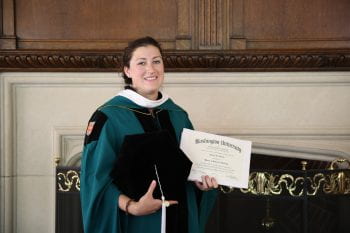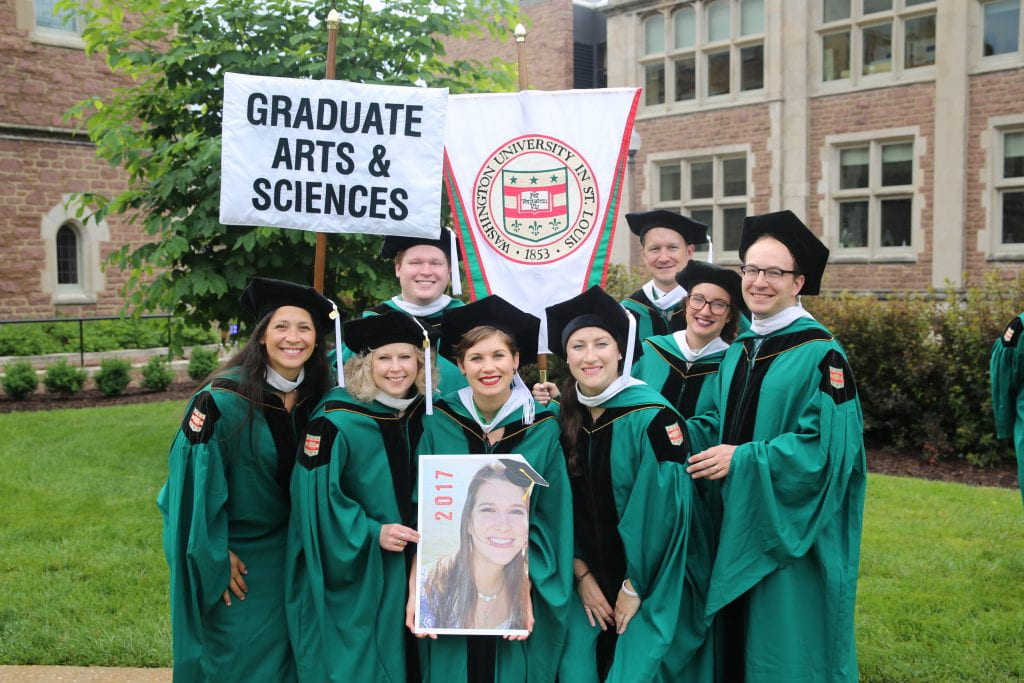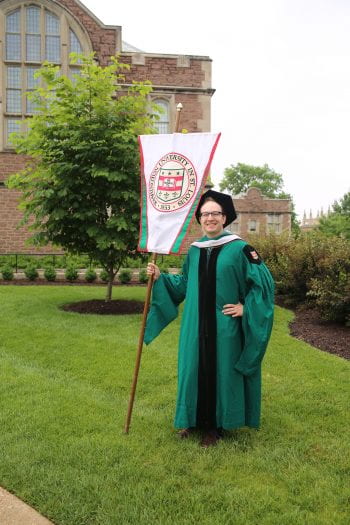Lauren Church joked it was going to be a photo finish. Her baby’s due date was May 15, and the recognition ceremony for her master’s in biology degree was May 16.
The baby was born May 9 and seven days later Church walked across a stage at Washington University in St. Louis after earning a master’s degree through the Master of Science in Biology for Science Teachers program.
“I was going to be there no matter what,” said Church, a 9th grade physics and 12th grade AP environmental science teacher at Mcclure North High School in Florissant. “Being in the program and graduating was a dream of mine.”
Church has been eyeing the program for the past couple of years, even saying the universe was sending her signals.
“I would get program mailers, people would give me the program brochure. I would think to myself, ‘One day that would be great.’
That one day came when her department chair asked if she had heard of the program and encouraged her to pursue it.
Coordinated by the Institute for School Partnership – the two-year program brings educators from across the country on campus each summer for a three-week intensive. The remaining coursework during the academic years is completed online.

“She said you need to do this, and I was like ‘Yes, I need to do this!’”
Church says the hybrid format is perfect for working teachers. The summer institute allows the cohort to immerse itself in the curriculum, personally do labs and meet each other and their instructors.
“When you get all these people in a room together it’s such a great dynamic. That’s the magic of the cohort effect,” Church said. “Having a sounding board and creative people that are easy to get along with all in one place is genius.”
Church sings the program’s praises saying it gave her tools and skills to enhance her curriculum. She said it was perfect timing because she was building her AP curriculum and used a lot of the information from the program and “plugged it right in.”
For Alton (Illinois) High School biology teacher Kristen Belcher, the program was a great fit right from the start.
“Everyone did my same job, and it was information that I wanted to know and learn, and the workload was doable,” she said.
In addition to bolstering her resume, the degree is already opening up opportunities for Belcher. She can now teach dual credit classes and is teaching adjunct at Saint Louis University.
As she walked across the stage during the recognition ceremony, Belcher said she was really proud of herself. “… prouder than I thought I would be,” she chuckles. “It was a great investment.”
Ned Heckman, a high school biology teacher in St. Paul, Minnesota, had several prerequisites when he was scouting out programs. He wanted a cohort program designed for teachers.
“The internet is a very powerful thing,” he said about typing in his preferences and being steered to WUSTL’s program.
“The cohort nature of this program has been amazing. The head of my school said the cohort is a valuable thing for long term professional development. There are similar programs but they are full distance learning and don’t have the sense of camaraderie like this one. We have so much in common. It’s awesome!”
The cohort grew so close, that when fellow graduate Meredith Salmon fell sick and couldn’t attend commencement, the group printed out a large photo of her and held it up throughout the ceremony.
Heckman said the program is already paying off for him. At the start of the program, he was only teaching biology, and now he’s the lead honors biology planner at this school. In addition, he was also given the opportunity to create a brand-new elective in genetics after taking genetics and evolution classes as part of the program.
For more information on the Master of Science in Biology program for educators, click here.
July 2017 | by, Myra Lopez

